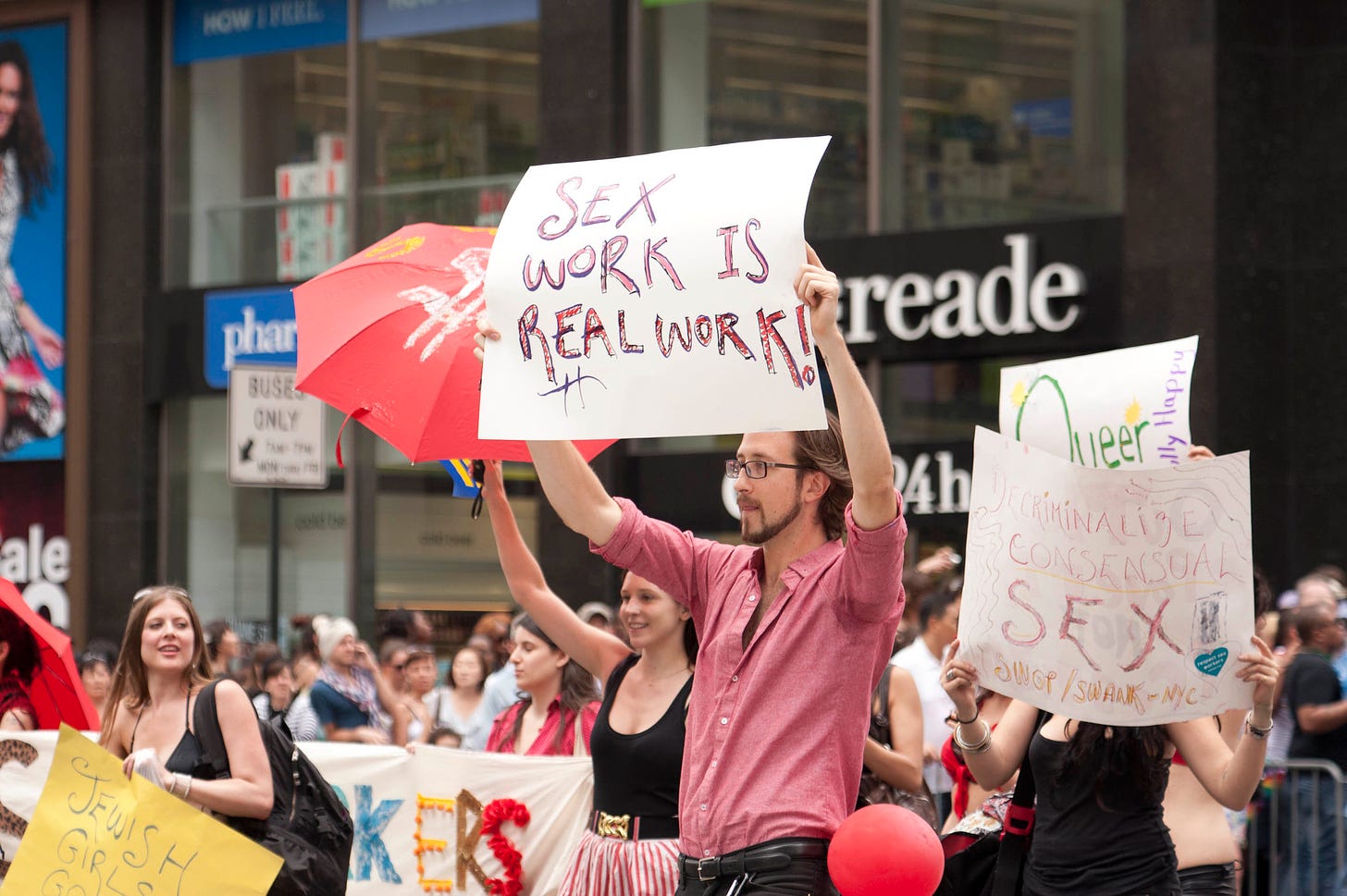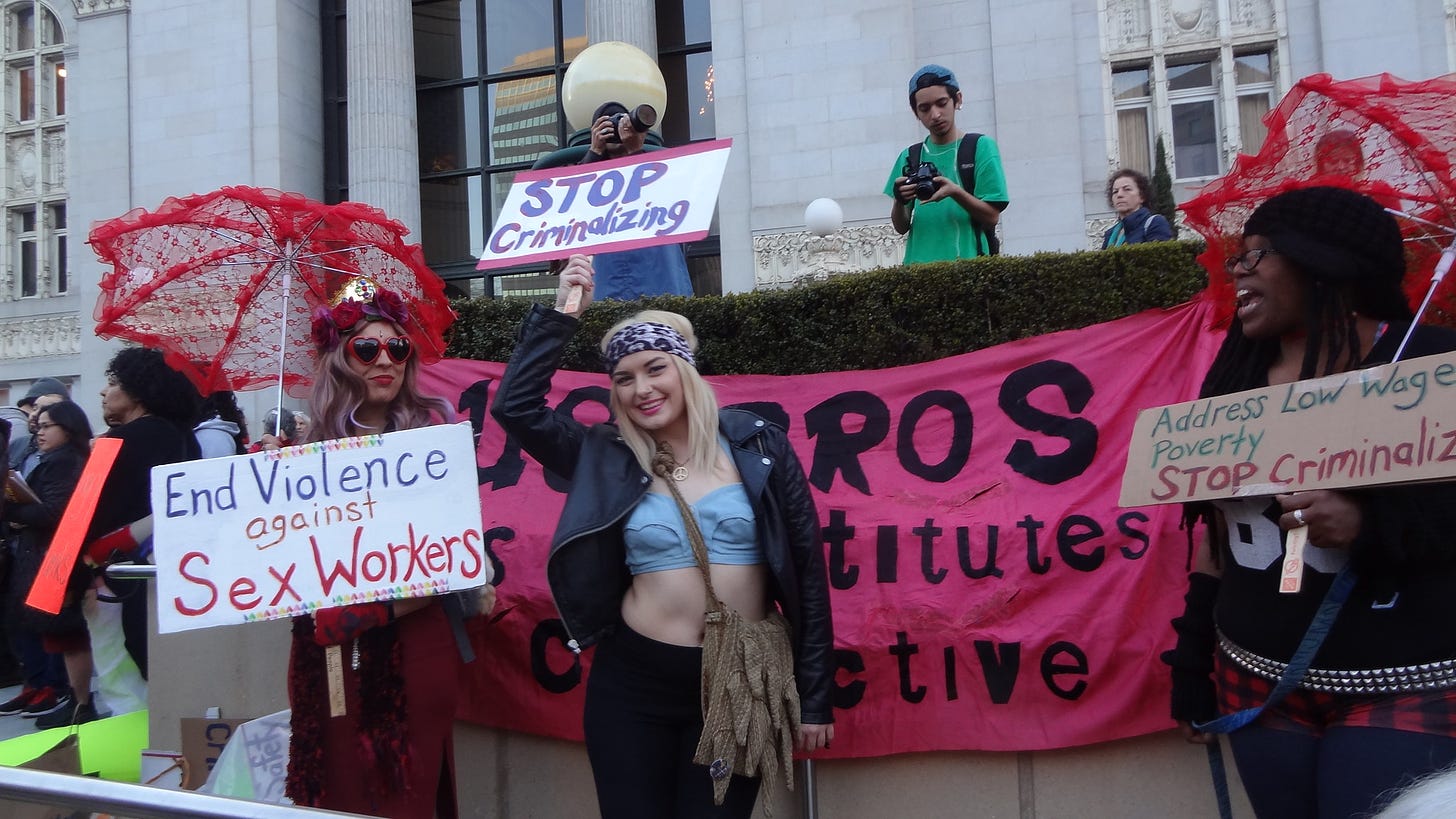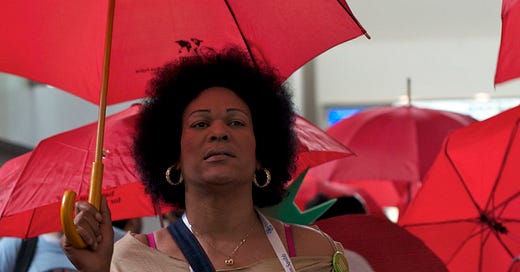Sex Work Is Work - Why It's Time to Decriminalize
HB67 would end the criminalization of sex work in Louisiana. Here's why that's a good idea.

Every day, people across Louisiana risk their freedom while going to work. For Louisiana’s sex workers, the act of earning a living is a rebellious one. In spite of the prevailing narrative which insists that a majority of sex workers are forced into the profession through coercion or human trafficking, many in the industry choose to be there. Sex work allows them to pay for housing, food, medical expenses, child care, and even higher education without facing discrimination over their race, religion, sexuality, disability, immigration status, or past criminal history. Sex work allows them to make high wages with flexible hours.
“I got into the sex industry when I was 18. Started out doing cam and phone work, then fetish modeling, then sensual massage, had a few sugar baby arrangements, and eventually pro-Domming,” notes one Louisiana sex worker (anonymous for obvious reasons). “I was making huge amounts of money that helped me attend college debt-free, purchase a vehicle, pay my family’s medical bills, and more.”
Unfortunately for many, the financial freedom and security offered by the work they do will come at the cost of their personal freedom and security. The criminalization of sex work makes them more vulnerable to violence, limits their access to health care and other services, and - of course - puts them at risk of prosecution and incarceration.
What is Sex Work?

According to Women With A Vision (WWAC) and the Sex Workers Advisory Committee (SWAC), sex work is defined as:
“the consensual, transactional labor that adults of all genders may engage in by trading sexual services for money or goods. This term is used to acknowledge and center the political implication of a labor perspective.”
Sex work is more than trading sex acts for money, however. As mentioned above, it includes phone sex, webcam modeling, exotic dancing, escort services, pro-Dom/me services, and more. While some of these - such as exotic dancing and webcamming - are legal and commercialized in some settings, others are not. This disparity is purposeful, systemic, and harmful on multiple levels.
“The criminalization of sex work is harmful to the individual, creating a work environment shrouded in secrecy and distrust,” says Lousiana State Representative Mandie Landry. “It is also harmful to the community, as it takes productive members out of their homes and puts them into jails. I support decriminalization on the basis of labor rights, harm reduction, and the basic bodily autonomy that all people have.” Landry is the author of HB67, a bill that would decriminalize sex work in Louisiana if it passes.
How is Criminalization of Sex Work Harmful?
Perhaps no one outlines the scope of how harmful the criminalization of sex work is better than the Orleans Parish Public Defenders Office:
“The criminalization of sex work is rife wth discrimination, racism, and sexism, and women of color remain disproportionately policed, stigmatized, and harmed by misguided policies that neither ensure the safety of consenting adults or the community at large. It is a waste of resources, increases unnecessary community interaction with law enforcement, and exposes already disenfranchised communities to further abuse and mistreatment. Fully decriminalizing sex work is a critical racial justice and human rights issue, and an essential element toward a more just, less harmful criminal legal system.”
When a person is arrested for sex work, their name, photo, and other information are often reported in local news outlets. This can lead to them facing harassment, employment discrimination, housing discrimination, and makes them the target of violence. Because of the nature of sex work, many police officers do not treat violence against or even the rape of sex workers with the same seriousness as it would be treated in other cases but is rather viewed as one of the risks of the job. Furthermore, any sex worker who dares to report violence or rape risks exposing themselves and being arrested or subjected to further violence instead.
“The criminalization of my job is always at the forefront of my mind in and out of my work environment,” says one Orleans Parish sex worker (anonymous for obvious reasons). “While I am at work I know my clients can turn on me at any point from physical violence to threats to out(ting) me, to withholding payment without any recourse on my part because they know I am legally powerless.”
Sex Work is NOT Sex Trafficking

Arguments against decriminalization often center around sex trafficking. But in spite of their best efforts, law enforcement agencies often fail to identify sex traffickers. In fact, although the federal government allocates $24 million each year to various law enforcement agencies for trafficking prevention, 90 percent of those funds end up being used to arrest consensual adult sex workers.
“Most published studies related to human trafficking and sex work are based on inaccurate data and unethical research methods,” notes Andrew Lewis, former Greater New Orleans Human Trafficking Task Force Coordinator. “I saw first hand how the data is manipulated to create a specific story.”
The truth is that sex workers are against all forms of sex trafficking. Unfortunately, the criminalization of sex work itself leaves them unable to report instances of trafficking when they see it.
“As one of the service providers to trafficking survivors in New Orleans, we understand that criminalizing consensual or survival sex work will not make trafficking survivors safer or allow them to come forward for help,” says Eva Lessenger, Director of Programs at the New Orleans Family Justice Center. “Criminalization pushes already marginalized folks further into the shadows when we should be supporting them through harm reduction and economic justice initiatives.”
What Does LA HB67 Do Exactly?
If passed, HB 67 would repeal the multiple legal provisions against sex work in Louisiana, including:
(1) Prostitution (R.S. 14:82)
(2) Purchase of commercial sexual activity (R.S. 14:82.2)
(3) Soliciting for prostitutes (R.S. 14:83)
(4) Inciting prostitution (R.S. 14:83.1)
(5) Promoting prostitution (R.S. 14:83.2)
(6) Prostitution by massage (R.S. 14:83.3)
(7) Massage; sexual conduct prohibited
(R.S. 14:83.4) (8) Letting premises for prostitution (R.S. 14:85)
(9) Enticing persons into prostitution (R.S. 14:86)
(10) Crime against nature by solicitation (R.S. 14:89.2)
(11) Operation of places of prostitution prohibited (R.S. 14:282)
It would also direct the Louisiana State Law Institute to conduct a study of the present law and make recommendations for other changes necessary to ensure sex work is completely decriminalized across the state.
WWAV supports decriminalization as a better option than legalization because legalization allows the state to set the terms for who might or might not qualify for a license - often in ways that do not eliminate the harms of criminalization. In fact, the group believes that legalization will only worsen the disenfranchisement experienced by the most marginalized sex workers.
“The framework of reproductive justice aligns with the call for racial and gender justice that the decriminalization of sex work provides,” Landry says. “Decriminalization isn’t just about what acts are criminalized; it’s also and more importantly about who is criminalized and why. With direct guidance from advocates and those who are impacted by the criminalization of consensual behavior, I support the decriminalization of consensual sexual labor between adults, which would decrease disparities across race, gender, and socioeconomics.”
ReportNOLA thanks Women With A Vision and the Sex Worker’s Advisory Committee for the use of their Sex Worker Decrim Toolkit for this report.
Support Local, Independent Journalism
ReportNOLA is the sole creation of Jenn Bentley - a local, independent journalist who is dedicated to serving the community of New Orleans. As a proud member of the Society of Professional Journalists, she is dedicated to ethical reporting on issues that matter. Please subscribe at the $5/mo level to help her continue to offer paywall-free coverage.



